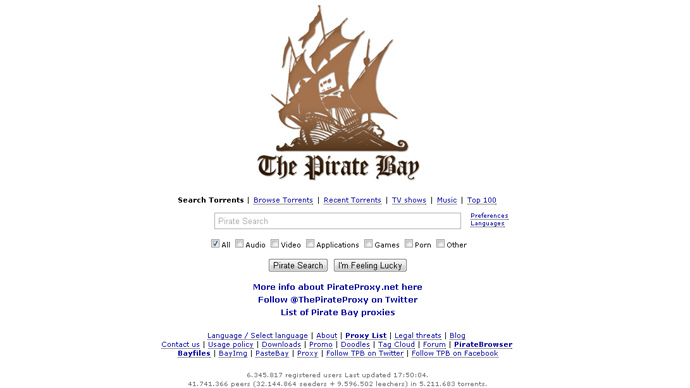Pirate Bay launches easy anti-censorship browser

The Pirate Bay has released a self-configured browser package, which allows users to skate around the anti-piracy censorship of certain governments. Now one can access TPB and other file-sharing websites blocked by internet providers in ‘one click’.
The team running the Pirate Bay (TPB) – one of the web’s largest
file-sharing sites – has launched a special PirateBrowser that
allows users “to circumvent censorship that certain countries
impose onto their citizens.”
The launch comes as TPB celebrates 10 years of harboring
‘pirated’ and other online content.
Rather than being standalone software, PirateBrowser is a
combination – or a ‘bundle’ – of a portable version of the
Firefox internet browser and a popular client of the anonymous
Tor network, Vidalia. The package is said to have the FoxyProxy
add-on and “some custom configs” built in, while assuring
that none of the programs had been modified, and that it does not
contain any adware, trojans, or toolbars.
“It’s a simple one-click browser that circumvents censorship
and blockades and makes the site instantly available and
accessible. No bundled ad-ware, toolbars or other crap, just a
pre-configured Firefox browser,” a TPB administrator
nicknamed Winston said in a release message.
He also urged people to recommend PirateBrowser to anyone, who
“can’t access TPB or other torrents-sites because they are
blocked.”
According to information posted on piratebrowser.com, countries
that have blocked access to the Pirate Bay include Iran, North
Korea, United Kingdom, the Netherlands, Belgium, Finland,
Denmark, Italy and Ireland.
While enabling the internet users in those countries “to
remove limits on accessing websites your government doesn’t want
you to know about,” PirateBrowser does not guarantee web
anonymity. To ensure complete anonymity, its compilers recommend
using VPN (Virtual Private Network) services.
The pre-configured browser’s release is the latest effort by the
Pirate Bay to disregard the growing number of legal actions
mounted against it and other file-sharing websites, as well as
against the distribution of copyright-infringing materials on the
web in general.
Most recently, corporate giants EMI, Sony, Warner Music and
Universal won a lawsuit against TPB in Ireland. A local court on
June 12 ruled that all major Irish ISPs must block access to The
Pirate Bay in 30 days’ time.
Similar court decisions were taken in the UK and the Netherlands
last year. Moreover, after a complaint by Dutch entertainment
industry’s anti-piracy association BREIN, a court in The Hague
ordered the Pirate Party of the Netherlands to stop publicizing
ways to circumvent the block. The party claimed it was legally
banned even from giving a website link to the well-known Tor
project.
Facebook and Microsoft’s Windows Live Messenger have also been
blocking all messages containing links to the Pirate Bay. While
Facebook claimed it has the right to use blocks on links where
there is a “demonstrated disregard for intellectual property
rights” based on their terms of service, Microsoft simply
started flagging such links as “unsafe.”
The efficiency of all such limitations have been questioned by
internet experts, as the use of proxy servers have continued to
grant an easy access to the blocked websites for those craving
for free media file content. The new TPB tool could thus mark a
further success of free internet activists in their fight against
the corporate rights-holders, as it brings the same practice to a
wider audience of less experienced users.














